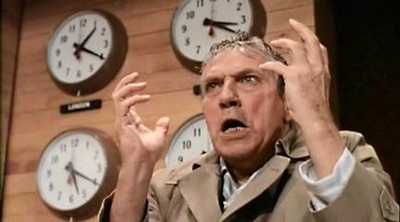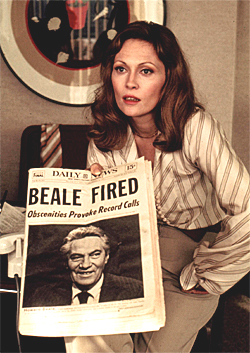
 |
|
|
|
To think that the remarkable comedy-satire Network would cede the Best Picture Oscar to Rocky is a pretty depressing thought. It's interesting that the opinionated Paddy Chayefsky's "jeremiad" about the madness of TV culture laments the rise of an audience of know-nothing Pod People -- the exact same audience pandered to by the likes of Rocky. Absarootly. Written and directed by men intimate with Television since its infancy, Network was nominated for just about everything on the Academy's menu, and Chayefsky and three of its actors took home Oscars. A black comedy so incisive and clever that many audiences were convinced that it was dead serious, the movie has been accepted as truly prophetic. Whenever a discussion gets rolling about the state of modern TV entertainment, with its debased reality shows and "news" shows that allow unqualified kooks to influence national politics, Network will more likely than not be mentioned. Chayefsky's wild fantasies of insultingly stupid, morally indefensible programming have come true -- or have been surpassed. Network is also a wickedly funny comedy that challenges a brace of top actors to work at their full potential. Paddy Chayefsky takes possessory credit for his radical vision, which represents some of his best work. Chayefsky's writing is always exhilarating, even when he chooses to argue both sides of an issue (The Americanization of Emily) or when props up a fruity sci-fi premise with reams of semi-mumbled mad doctor jargon (Altered States). Structure-wise, Network repeats Chayefsky's The Americanization of Emily and The Hospital, both of which see a dysfunctional institution shattered by an aging madman obsessed with crazy ideas. 
UBS Anchorman Howard Beale (Peter Finch) is slipping in the ratings; his network is running dead last and big changes are expected now that a faceless corporation has bought a controlling stake. Howard snaps under the strain and announces that he will kill himself on the show, a major broadcasting gaffe that results in his instant dismissal. But the ambitious new director of programming Diana Christensen (Faye Dunaway) wants to revive the network by stretching the rules. She sees Beale as a potential ratings magnet, if he can mobilize viewer discontent and rage at the ills of modern society. Corporate hatchet man Frank Hackett (Robert Duvall) is appalled until Diana convinces him that the only way to get his career out of the toilet is to take risks. Beale returns to the air and galvanizes the public with sermons demanding that the ills of America be fixed, and damn quick. With Beale a resounding success, the UBS News Division loses its autonomy and will now be "programmed" by Diana. She turns the nightly news broadcast into a meaningless variety show centered on the new "prophet" Howard Beal. She also stretches the First Amendment protection of the Free Press to create The Mao-Tse Tung Hour, a show produced by Communist zealot Laureen Hobbs (Marlene Warfield). UBS will pay the "Ecumenical Liberation Army" to film genuine acts of political violence, so they can be broadcast as an entertainment show. News producer Max Schumacher (William Holden) is Beale's buddy from TV's Golden Age. He wants to protect the clearly deranged Howard but can't do much for him after he's fired in the various power plays. Max falls into an affair with the ice-cold ratings maven Diane and leaves his wife Louise (Beatrice Straight). The only thing that will stop the madness is if Howard Beale's ratings drop. By 1976 Hollywood films had largely become a director's game so it's refreshing to see Paddy Chayefsky punching through with a genuine writer's film that makes the young film-student geniuses look like kids playing in a sandbox. Chayefsky can become strident and even hysterical -- the picture has two or three too many instances of grandstanding author's oratory -- but the majority of Network is dead-on wicked satire backed by a genuine sense of outrage. Howard Beale's nutcase prophecies are emotional howls of protest that get our collective backs up and make us want to shout his "mad as hell" mantra. But Chayefsky's script goes around Howard's whining to identify and skewer what he thinks is the engine of society's decline -- the corporate takeover of all human existence. Even Howard Beale bows before the ultimate "God" of the boardroom (a wonderful Ned Beatty), a man who tells him the truth: there are no more nations or governments or even individual lives. All real power and authority is economic, and the world's economies are being managed by constellations of corporations. Information is power, and Chayefsky preaches that control of the information we receive will alter the shape of our world. That much has already happened, with just a few entities owning multiple networks and TV stations and large numbers of newspapers (the ones that still exist). TV news was once the domain of a small cadre of New York video journalists, but in Network real journalism is wiped out because it doesn't serve the corporate owners' key function, which is to make money. Even Howard Beale becomes the puppet of this fantastic state of affairs, which depending on one's paranoia quotient is either the natural course of business or a cosmic conspiracy. Ned Beatty's fulminating voice of authority describes a future that casts individual citizens as passive cogs in a grand scheme that takes care of their material needs and keeps them amused -- anesthetized -- through cheap entertainment. Don Siegel's eerie The Invasion of the Body Snatchers makes us worry that dehumanization will result from outside political forces. Network tells us that "giving you a number and takin' 'way your name" is a natural result of the evolution of big economics. Back on the comedic level, Network contains some of Paddy Chayefsky's funniest writing. As if expelling a life's worth of anger at the industry, Chayefsky hurls mud in every direction. The blasé control room teams don't even listen to what Howard Beale is saying, while the executives in authority think of little else besides jockeying for position, fortifying their tactics and covering their tails. The new crop of corporate lizards are crafty killers in corner offices. Duvall's Hackett is a grim creep who loves to use his power to crush creative personnel. Diana flaunts her "new woman" status, leveraging her sexual attractiveness as part of her no-prisoners plan to succeed. Everything for these people is winning. They display their faults proudly, as if ruthlessness and venality were desirable qualities. The old veterans haven't got that much of a moral advantage, and retreat into reveries of better days. Lily-livered division chief Nelson Chaney (Wesley Addy) is shocked by the changes in programming but elects to keep his miserable high-paying job. White-haired president Ed Ruddy (William Prince) thinks that the new wildcats will cut their own throats, but miscalculates. William Holden's Max carries on a mirthful drinking relationship with his old buddy Howard. His strongest suit is loyalty but he can also be an insecure fool, chasing after the hard-as-nails Diana and mistreating his wife. Peter Finch's Howard Beale represents Chayefsky's spirit of anarchy, disguised as a washed-up veteran with a knack for communicating to his audience. Beale is a wacked-out Walter Cronkite, the wise grandfather who suddenly advises that we start burning everything in sight. The audience for Network hadn't been shaken up in this comedic fashion since Dr. Strangelove. We immediately loved Howard Beale, and were saddened when Peter Finch passed away before he knew he was nominated for Best Actor. Every actor in the show shines, with William Holden and Peter Finch glowing more brightly than ever. Holden in particular had been underused in the latter part of his career, and see him performing at this level again is truly inspiring. 
Network never actually stumbles but its softer side is exposed in the final act. The drama circles back to the Max Schumacher character, which provides some great scenes (like Beatrice Straight's amazing "winter passion" retort) but fails to make us care about the anxieties of Golden Age dinosaurs in their waning years. Chayefsky was still going strong, and director Sidney Lumet was barely past the halfway point in a career that's still turning out good movies. Some cutting also seems to have occurred. When we hear that, like Ed Ruddy, Black Power firebrand Laureen Hobbs is "gone", we wonder if the terrorist Great Ahmed Kahn (Arthur Burghardt) didn't kill her so as to cut out the middleman and deal directly with network maven Diana.
The makers of Network claimed that it wasn't a satire, but their show is a Black Comedy all the way. It remains wickedly funny no matter what awful, impossible things seem to occur, and it's doubly funny (or scary) now that its unthinkable TV show concepts seem almost viable as today's reality programming: shows about murders, executions, etc.. Chayefsky is lucky in that his lampooning of the Symbionese Liberation Army and Patty Hearst hasn't been rendered uncomfortable by history -- those deranged bandits are still fair game. We know that Chayefsky and Lumet have succeeded when the "crazy" corporate decision to commit cold-blooded murder seems perfectly acceptable in context: "Well, I suppose we'll just have to kill him." Henrik Ibsen would have approved -- the victim is an Enemy of the Warner Home Video's Blu-ray of Network presents this special show in fine form. Cinematographer Owen Roizman seems to have filmed in the New York style of the day, perhaps even pre-flashing the film to soften the hues and add a bit of grain. Therefore be ready for scenes that don't have today's all-slick, all candy colored appearance. The extras collect the contents of earlier special editions, the newest being from 2006. The main event is a multi-chapter making-of retrospective by Laurent Bouzereau. Through it and Sidney Lumet's feature commentary we pick up a lot of the spirit of New York television, which Lumet and Chayefsky helped establish. Looking at the IMDB, we also see that a number of the featured actors had been collaborators with the two men back in the "Golden Age". Lending additional credence to the extras is a piece with Walter Cronkite, who considers the show a wild exaggeration (that's a relief) and affirms that his colleagues in the TV news business thought it excruciatingly funny. Two more extras offer close-up interviews with Chayefsky (on the Dinah! talk show) and Lumet (questioned by Robert Osborne of TCM). An original trailer rounds out the package. Passing note: I was surprised to see that a young Tim Robbins plays a killer in the film's final scene.
On a scale of Excellent, Good, Fair, and Poor,
Network Blu-ray rates:
Reviews on the Savant main site have additional credits information and are often updated and annotated with reader input and graphics. Also, don't forget the 2010 Savant Wish List. T'was Ever Thus.
Review Staff | About DVD Talk | Newsletter Subscribe | Join DVD Talk Forum |
| ||||||||||||||||||